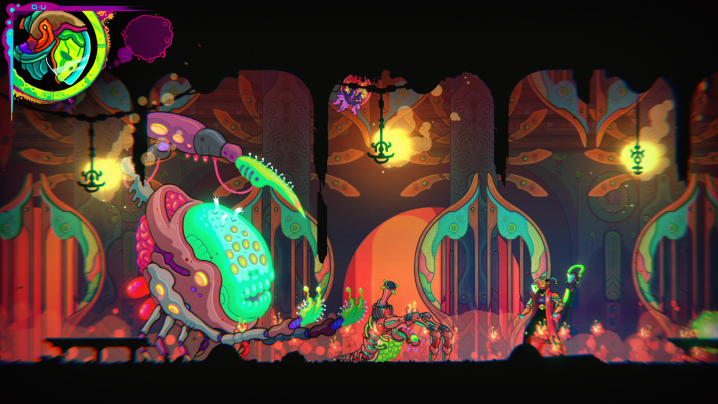With a mercilessly busy 2023 winding down, you’d think that I’d be ready for a break from video games. And trust me, I am, but I still can’t help but look forward to what’s on the horizon in 2024. I already know that games like Final Fantasy VII: Rebirth and Like a Dragon: Infinite Wealth are bound to consume me, but there’s one indie game that I especially have my eye on: Ultros. The ultrastylish Metroidvania left a strong impression on me at this May’s PlayStation Showcase. That was largely thanks to its eye-popping visual style that’s unlike anything I’ve seen in a video game before.
While Ultros has the look, I was less certain about how it would actually play. I’d finally get a sense of that during a sweeping 90-minute demo. The segment I played would give me a feel for its deceptively deep combat, oddball farming component, and surprising roguelike structure. It was a complicated gameplay snippet that I couldn’t fully get my head around by the end, but that just leaves me even more curious about the final product.
The cycle goes on
At first glance, Ultros appears to be a straightforward game. It seems like your typical 2D Metroidvania where players dash through a maze-like map collecting power-ups. Within minutes, I figured I understood the entire gameplay loop. That was fine by me, because it gave me more time to soak in its wild art style, which really makes it unique. Every room is a psychedelic wash of colors that looks like a Grateful Dead poster. All the painterly details can make it a little hard to navigate, but I loved making my way through all of its gooey alien locales, which are rich with vibrant flora.
The more I played, the more I realized that Ultros isn’t just a standard Metroidvania with a kooky art style. It features a host of gameplay systems I’ve never seen in the genre before. Chief among those is its roguelike structure. At certain moments in the story, players start back from the beginning. Any upgrades they earned are wiped away, though map progress remains. I’d experience two full loops during my demo, each of which ended when I killed a Shaman.

The cycle concept is admittedly a little hard to parse. After my first run, I found myself a little peeved when I realized I had to backtrack through tons of screens I’d already explored to regain my double jump upgrade and travel to a new area from there. Ultros also features a massive skill tree that unlocks game-changing combat and traversal mechanics — and those are wiped away on a new cycle. Fortunately, there is a currency to lock skills down permanently, but I can see where gathering enough materials to unlock the same skills over and over could become a drag.
Though I have questions about that system, the demo gave me a glimpse at some of the creative ways it’s implemented. For instance, Ultros includes a surprising farming component where players can drop seeds in certain spots during a run. I had no idea what that did when I planted my first one, but when I returned to the soil on my second cycle, I found that the plant was now tall enough to get me up to a previously unreachable platform. The more the final game plays with time-changing ideas like that, the more I expect I’ll click with cycles.
What’s less of a question mark is the core Metroidvania gameplay, which is off to a strong start. In particular, Ultros’ hack-and-slash combat seems to have a lot of depth. It begins with some basic attacks and sliding to evade enemies, but quickly widens out with different maneuvers unlocked through the skill tree. There are two distinct hooks. One is that combat encounters are graded, with higher marks given the more moves are used. The other is that there’s an emphasis on “juggling,” as players can smack an enemy into the air to hit another. The more I got the hang of that system, the more I clicked with Ultros. It has the stylish self-expression of a 3D action game like Hi-Fi Rush, but impressively translates it to a 2D context. I’d get to make the most of it in a tough boss encounter that had me getting up on a monster’s back and unleashing as many moves as possible to maximize my damage.

That system pairs with the traditional platforming you’d expect from the genre. One standout sequence had me snaking up a series of rooms by climbing a massive sword steadily jabbing into the ground. It’s nothing fancy, but the splashy visual style makes basic platforming segments feel alien. That should go a long way toward making Ultros feel distinct even when it’s sticking to the Metroidvania beats.
After 90 minutes, I still don’t really know what to expect from Ultros — and I’m glad. That level of mystery is exactly what sold me on the indie in the first place, so I’d be a bit disappointed had I walked away from it all feeling like it was playing it safe. I look forward to seeing just how many layers the eccentric title has, even if not every one of them is a winner.
Ultros launches on February 13, 2024, for PC, PlayStation 4, and PS5.



